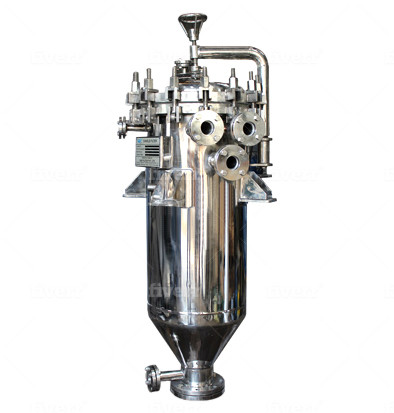Description
Candle Type Filters work on the basis of pressure. The fluid to be filtered is forced through a series of vertical filters (candles). The solids in the fluid being filtered cakes on the filter candles until flow is decreased and pressure starts building. At that point, the flow is reversed and the caked solids are blown off the candles, where they drop to the bottom and fall out of the filter. The candles can be made out of a wide variety of materials from cloth to ceramic to metal. Depending on the material used and the material being filtered, these filters may need to be replaced on a regular basis, and/or filtering aids such as Diatomite or Perlite may need to be used and continually dosed into the system (to pre-coat the filters), plus they require regular cleaning and maintenance.
These systems also require close monitoring to make sure the pressure is balanced just perfectly to get the cake to stick to the candles and build up, to make sure the build up is even and not to heavy, to make sure pressure isn’t building up too high, to adjust the flow rate coming into the system, to make sure the filtering aids are being applied and working properly, etc. Thus, these system are best in environments that either run consistently with a consistent level of solids and flow rate, or are only needed for occasional batch processing. A glass production environment is rarely consistent with machines coming on and off line, different types of grinding and polishing jobs going on throughout the day or week, stopping and starting for breaks and shift changes, etc.
In addition, glass fines are extremely heavy and compact quickly into a concrete-like material, which produces some potentially big problems. Due to the weight of the glass fines, the in-flow pressure must be high to get the solids to stay on the candles and cake up as they should. This may require more pressure than what the system or this filtration type was designed for. Then, if the cake is formed properly, due to the dense, compacting nature of glass fines, they may be difficult to blow off the screens. Candle Type Filters are a good filtration system for certain applications that run consistently with lighter solids, but the level of maintenance and potential problems with glass fines make them less than ideal for the glass fabrication industry.


Reviews
There are no reviews yet.